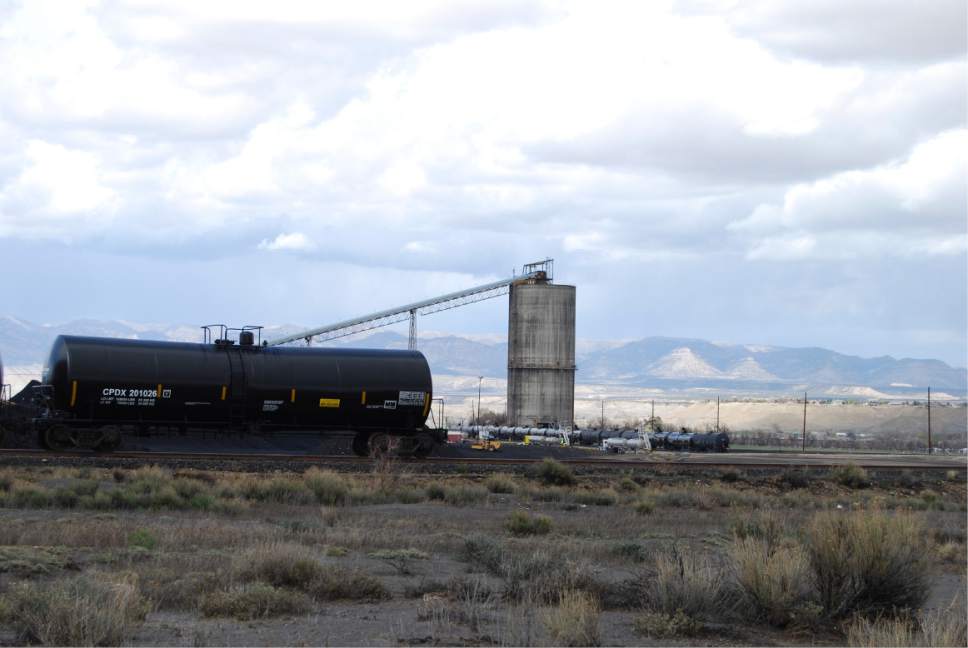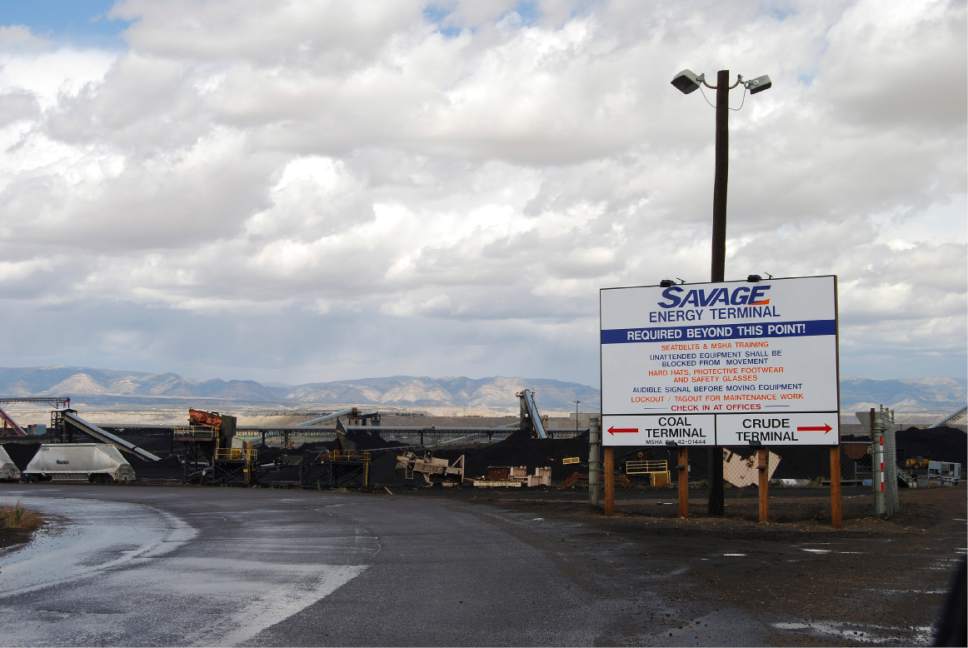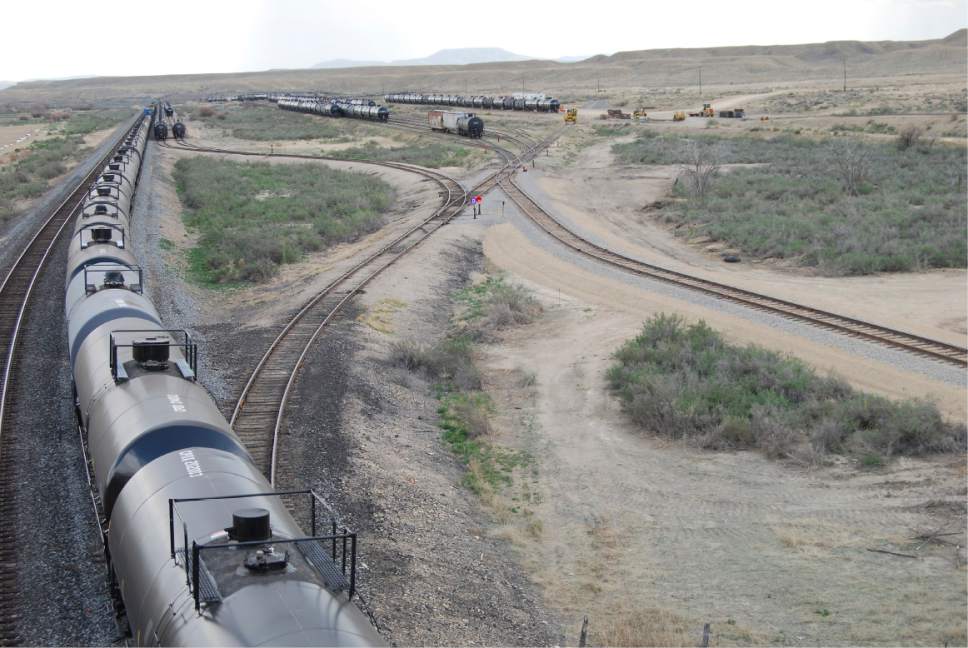This is an archived article that was published on sltrib.com in 2017, and information in the article may be outdated. It is provided only for personal research purposes and may not be reprinted.
Several mineral-rich eastern Utah counties banded together a few years ago to build costly commodity-moving projects needed by extractive industries to tap underground resources and get them to market.
Utah's isolation puts energy development at a competitive disadvantage, so, these county officials argue, the state should subsidize export terminals and rail, pipe and utility lines that help move Utah's coal, oil, gas, power and potash. That "throughput" infrastructure, in turn, helps lift economic prospects for rural Utah communities, including Price, Monticello, Huntington, Richfield and Vernal, that have historically relied on resource extraction.
So goes the logic behind the Seven County Infrastructure Coalition (SCIC), which has sought and secured millions from Utah's Permanent Community Impact Fund, a massive pool of federal mineral royalties set aside to help rural areas that struggle with puny tax bases, thanks to having so much public land within their borders.
The fund is overseen by an 11-member community impact board, or CIB for short, which doles out this money to municipalities and special-service districts for projects that address impacts from industrial development and provide essential public services.
Now, spending by the county coalition — made up of Emery, Duchesne, Uintah, Daggett, Carbon, San Juan and Sevier counties — has come under serious scrutiny from a new board member, state Treasurer David Damschen, who succeeded Richard Ellis in 2015.
Damschen is openly skeptical whether coalition projects, geared toward economic development, are a legal use of CIB money and whether rural Utahns have much to show for millions of dollars that have already passed through the group.
—
New reckoning • At Thursday's monthly CIB meeting in Salt Lake City, Damschen put executive director Mike McKee, a former Uintah County commissioner and CIB member, through a tough line of questioning, seeking to learn how the coalition spends its CIB grants and selects outside professional services.
He voiced concern with a lack of transparency in how the coalition operates and with the "public-private" funding model it pursues for proposed projects, such as a transmission line, pipeline and railroad serving the Uinta Basin oil patch.
The treasurer noted that private investors prefer projects with dense traffic and reliable revenue streams that promise higher rates of return.
"The opportunity for deals that will pencil and draw private capital in rural Utah, to call it a steep climb is a tremendous underestimate," Damschen told McKee. "Private capital carries a steeper price tag than municipal debt. You are saddling taxpayers with those costs," Damschen told McKee, who was flanked by the coalition's two top consultants, attorney Eric Johnson and Brian Barton of the Utah civil-engineering firm Jones and DeMille.
Spurring the treasurer's concern was a $5 million grant awarded to the coalition to inventory eastern Utah's infrastructure. McKee, for his part, noted that the grant and the coalition's mission were nurtured by the CIB's then-chairman Gordon Walker, who retired two years ago, and both enjoyed unanimous board support three years ago.
"We are talking about things that are not typical CIB funding," McKee said. "We are thinking outside the box to look at what can we do to enhance our industries so we can be competitive."
—
A wary eye • McKee acknowledged his annual salary is $160,000, a little less than the $175,000 paid to his predecessor Sen. Ralph Okerlund, R-Monroe.
Legal fees have consumed $377,000, while the Springville-based Jones and DeMille engineering firm was awarded a $1.7 million contract to conduct the infrastructure study, which appears to be incomplete after more than two years. That study is to help the coalition identify projects to promote.
"I look at the legal expense, the engineering expense and the significant salaries and I don't see any ongoing revenue source that the coalition has other than grants from the CIB. Every dollar that goes into the coalition and these studies is a dollar that doesn't good into good projects in other rural communities," Damschen said.
"We need transparency and we need efficiency," the treasurer said. "I don't doubt anyone's intention, but as a board we have to keep an eye on whether this is an effective use of funds."
The coalition provided data detailing its grant spending, but Johnson resisted its public release, arguing that it and anything else the coalition submits to Damschen should be subject to attorney-client privilege.
The CIB disagreed and released the information to The Salt Lake Tribune.
The document indicates the coalition has thus far spent nearly $3 million of the grant, much of it on administrative costs, including $53,638 on "CIB issues" and $12,095 on a failed bid to direct a $100,000 CIB grant toward the renovation of a historic swinging bridge just across the Colorado state line in Moffat County.
—
Cozy relations • Membership in the SCIC has changed since its birth in 2014, but it has always included Emery, Duchesne, Uintah, Daggett, Carbon and San Juan counties. Grand dropped out early on over many residents' objections to the coalition's interest in cutting a highway through the Book Cliffs. Coal-rich Sevier County, meanwhile, joined the coalition this year.
If there is a lot of overlap between CIB and coalition leadership, it is no coincidence. Minerals extracted in coalition counties provide the bulk of CIB revenue, so by law the counties get heavy representation on the 11-member board.
When headed by Walker, the CIB approved huge grants for energy-related projects, such as $50 million to develop an oil-tanker rail line out of the Uinta Basin and the $5 million to survey infrastructure in eastern Utah.
At the time, four CIB members were commissioners from coalition counties, while a fifth was an investment banker, Jeff Holt, who specialized in the private-public financing deals that the coalition proposes.
Holt also was a key figure behind the CIB's controversial decision to loan $53 million to four coal-producing counties to invest in an export terminal under development in Oakland, Calif. That deal fell apart when the Oakland City Council banned the movement of coal through that East Bay city.
Currently, two CIB members are listed as coalition board members: Carbon County Commissioner Jae Potter and Sevier County Commissioner Tooter Ogden. Until last month, McKee himself was the longest-serving CIB member. He resigned his seat on the Uintah County Commission to take the helm of the coalition. He has since been replaced on the CIB by Vernal Mayor Sonja Norton.
—
Backing rural Utah • Last year, the CIB distributed $98.3 million to 76 rural projects. Forty-three percent of that money went in the form of loans, the rest in grants. Roads, public safety, buildings and sewer consumed the lion's share — projects that elsewhere are typically covered by tax receipts in the name of providing basic public services. Under Walker's leadership, the CIB leaned in a new direction: toward massive infrastructure projects meant to encourage more resource extraction and grow the tax revenue pie.
The Oakland export terminal is a prime example, but many in Utah government warned such projects are not eligible for CIB funds under federal law. Last year, the Legislature engineered a workaround by diverting $53 million from the CIB through the Department of Transportation to set up what now is called the "Throughput Infrastructure Fund," which is to provide loans for pipelines, railroads and export facilities.
This is the same pool of money the county coalition now hopes to tap for a pipeline to move oil from Duchesne to a rail hub at Wellington, among other projects.
Potter, from Carbon County, offered an eloquent defense of the idea.
"Nothing that has been done has not been for the common good," Potter said. "I am looking for additional revenue from these projects to buoy up what he have."
Eastern Utah is not enjoying the economic vitality seen in the rest of the state, so it makes sense, Potter argued, for the CIB to support projects that bolster economies that keep the impact fund flush.
"If the mineral jobs go away, the permanency of this board and what this board does goes away," said Potter. "The thing that we offer is the energy we produce that makes this state what it is."
McKee said he hopes coalition projects will help reduce or eliminate some of Utah's ongoing economic disadvantages, while also fulfilling CIB goals.
"There are lot of good things happening," McKee told the board. "I want you to know we are not out here on a sinking ship."
Twitter: @brianmaffly







